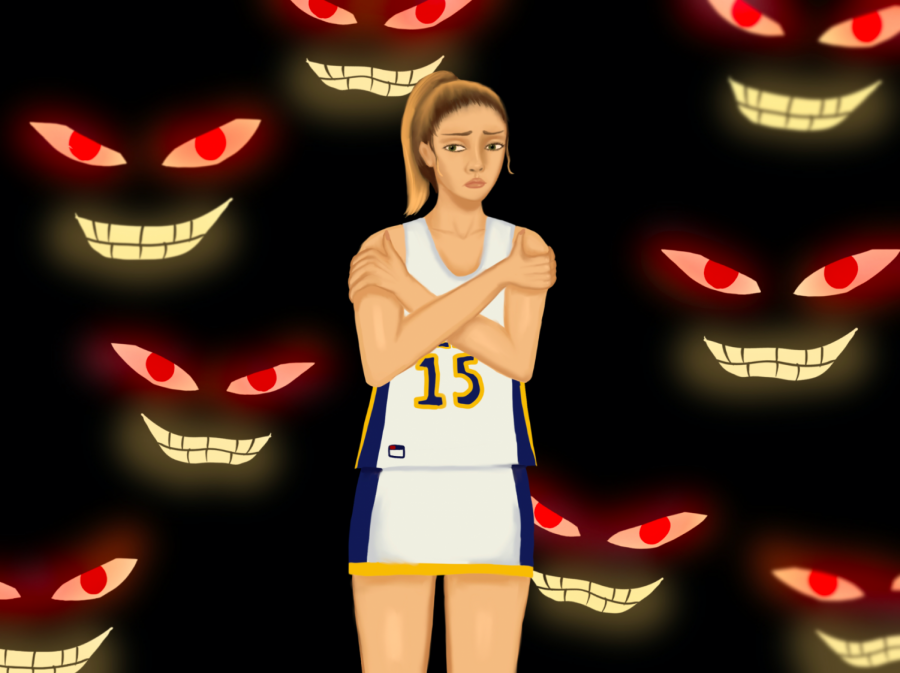The Male Gaze Infiltrates Menlo Sports
June 2, 2021
To me, sports are a celebration of the human body — of its capabilities, its strength and its raw power. When I play sports, my body is on display. My body is beautiful. The shape of my body isn’t what makes it beautiful, but how I move it. The way I weave through opponents, dodging with precision, is beautiful. I liked when people in the stands would watch my body’s every move and cheer as I scored. Until I didn’t.
Until a referee said that the fit of my team’s uniform was disgusting. All of a sudden, I wondered if the people in the stands were watching my curves rather than my strength. It made me feel sick. I wondered if I really was disgusting and cheap, strutting around in a short skirt.
When I randomly grabbed a skirt from a pile of sweaty, school-mandated polyester and put it on, I didn’t think much of it. After all, lacrosse isn’t about showing skin; it’s about how I can move.
Since Menlo and the Bay Area have a relatively progressive culture, my team wasn’t that concerned about how much skin we were showing. Given we don’t have a dress code, many girls wear crop tops, short skirts and short shorts to school. The Menlo community allows us to choose our attire without fear of punishment.
And so I began sprinting down the field, my skirt inching up as I cradled the ball. Just as I was about to pass to my teammate, I heard a sharp voice from behind me.
“Fifteen! Pull down your skirt!” the referee, a middle-aged woman, said to me. I tugged it down quickly to cover my spandex shorts underneath. For the rest of the game, I continued tugging on the skirt that wouldn’t stop riding up.
After the game ended, my teammates and I gathered on the sidelines to hear my coach debrief the game. It turned out there was more to debrief than just how we played. According to my coach, the referee was not pleased. She was disgusted by “the number of buttcheeks out,” and she felt it was offensive, intentional and utterly disrespectful. She even went so far as to threaten to speak to our athletic director.
At first, I burst out laughing. Perhaps it was the sheer shock factor that made me laugh so hard. But as the words settled in, so did a foul feeling in my stomach. “Intentional” was one word that continued to echo in my mind long after the game. Was she implying that I meant to have my butt out? That I wanted the attention? It stung. After all, I was just there to play the game that I love.
“Disgusting” also lingered. I couldn’t help but wonder if it was a boy in a uniform too tight or too small. Would he be called disgusting too? Would his ref imply he was intentionally showing off his body? I don’t think so. Society places much less emphasis on a man’s body than it does on a woman’s body. We are constantly under pressure to look good. That’s why 75% of patients with an eating disorder are female.
For example, in American culture, a man can go to a beach shirtless. Sure, he might be gawked at, but few deem it an invitation for inappropriate comments or an invitation for sexual advances. It’s normal.
Many women can’t go to the beach shirtless without being afraid for their safety, without their body “inviting” harassment. Even in European countries where nude beaches are legal and somewhat common, men are three times more likely than women to attend a beach nude, according to an article by the Smart Traveler.
A survey conducted by Penn, Schoen, and Berland Associates, or PSB, shows that 87% of women from ages 18-64 have been catcalled or street harassed and that 84% of these women consider changing their dress and/or behavior to avoid harassment. Society has built different connotations around female and male body parts, and women feel the need to cover up to protect themselves.
But why did a female ref comment on the revealing nature of our uniforms? Shouldn’t she understand the struggles of being a woman in America? A phenomenon known as the male gaze can explain her actions. According to an article from The Conversation, this feminist theory explains the lens heterosexual men view women through, one of objectification and sexualization.
As a result of patriarchal culture, men mostly lead the media industry, according to an article from McKinsey.com. This potentially explains why in many movies the camera will linger on a woman’s body for no plot-related reason, to please and cater to the heterosexual male viewer. It explains why Marvel’s Black Widow strides into battle in a thin and skin-tight suit, and the inexplicably long scenes focused on her body.
According to WomensAgenda.com, females are four times more likely than men to be shown wearing revealing clothing and sexualized. Further, female characters are almost twice as likely to be partially nude on screen, and 15 percent of women in film have the camera focused on their body parts in slow motion compared to just 4 percent of men.
Female objectification in the media is a blatant manifestation of the way Americans, including women themselves, subconsciously look at women through a lens of sexualization to some extent as a result of the male gaze.
Everyone, including our ref, is subject to the male gaze. We’ve been trained to see women as objects of sexual pleasure. Even if the ref doesn’t make a point to treat young women as sexual objects, the male gaze has still buried itself into her subconscious, affecting her decisions as it does the rest of us.
Neither my teammates nor I should have to feel like our body is something to hide ever again. I don’t want to feel guilty for my body simply existing. And I never want a ref to think it’s okay to call the fit of a uniform on a 15-year-old girl disgusting.



